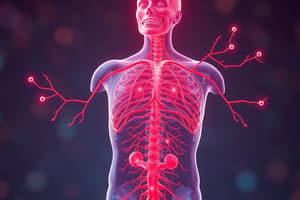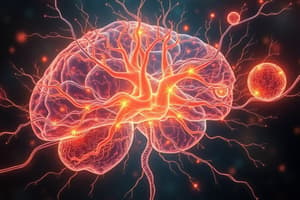Podcast
Questions and Answers
What is the primary characteristic of transmission at the junctions in the efferent autonomic pathway?
What is the primary characteristic of transmission at the junctions in the efferent autonomic pathway?
- It is chemical in nature. (correct)
- It is influenced by hormonal factors.
- It is purely electrical.
- It involves direct neuronal connections.
Which of the following best describes the mode of action for drugs affecting autonomic activity?
Which of the following best describes the mode of action for drugs affecting autonomic activity?
- They directly stimulate muscle contraction.
- They increase electrical impulses in neurons.
- They block the uptake of oxygen in the tissues.
- They alter the chemical transmission at junctions. (correct)
Why are junctions in the efferent autonomic pathway considered important for pharmacological intervention?
Why are junctions in the efferent autonomic pathway considered important for pharmacological intervention?
- They enable chemical transmission that can be manipulated. (correct)
- They are the only sites for synaptic communication.
- They serve as barriers to drug absorption.
- They allow for modification of electrical impulses.
Which of the following statements is incorrect regarding drugs that affect autonomic activity?
Which of the following statements is incorrect regarding drugs that affect autonomic activity?
In pharmacology, what aspect of the efferent autonomic pathway is most relevant when considering drug action?
In pharmacology, what aspect of the efferent autonomic pathway is most relevant when considering drug action?
Which process is directly affected by drugs impacting neurotransmitter activity?
Which process is directly affected by drugs impacting neurotransmitter activity?
What action do drugs have on neurotransmitter receptor binding?
What action do drugs have on neurotransmitter receptor binding?
How do drugs affect neurotransmitter storage within neurons?
How do drugs affect neurotransmitter storage within neurons?
What is a potential effect of drugs that inhibit the reuptake of neurotransmitters?
What is a potential effect of drugs that inhibit the reuptake of neurotransmitters?
What role do drugs play in the breakdown phase of neurotransmitter activity?
What role do drugs play in the breakdown phase of neurotransmitter activity?
What type of autonomic fiber is associated with the neurotransmitter acetylcholine?
What type of autonomic fiber is associated with the neurotransmitter acetylcholine?
Which statement best describes the unique feature of adrenergic fibers?
Which statement best describes the unique feature of adrenergic fibers?
What is the primary function of the sympathetic nervous system during emergency situations?
What is the primary function of the sympathetic nervous system during emergency situations?
How do drugs typically affect autonomic nervous system (ANS) activity?
How do drugs typically affect autonomic nervous system (ANS) activity?
Which of the following is NOT a characteristic of autonomic fibers?
Which of the following is NOT a characteristic of autonomic fibers?
In what context does the sympathetic nervous system operate collectively?
In what context does the sympathetic nervous system operate collectively?
Which receptor type is most commonly associated with cholinergic fibers?
Which receptor type is most commonly associated with cholinergic fibers?
What distinguishes the distribution of cholinergic fibers from adrenergic fibers?
What distinguishes the distribution of cholinergic fibers from adrenergic fibers?
Which of the following is NOT a function associated with the sympathetic nervous system during an emergency?
Which of the following is NOT a function associated with the sympathetic nervous system during an emergency?
What term describes the unified discharge of the sympathetic nervous system in response to stressors?
What term describes the unified discharge of the sympathetic nervous system in response to stressors?
Which reference would you consult for detailed physiological mechanisms related to medical physiology?
Which reference would you consult for detailed physiological mechanisms related to medical physiology?
Which edition of Ganong’s review of medical physiology includes sections on fundamental physiological processes?
Which edition of Ganong’s review of medical physiology includes sections on fundamental physiological processes?
What section in the 25th edition of Ganong's review covers essential physiological concepts?
What section in the 25th edition of Ganong's review covers essential physiological concepts?
Which source is noted for its comprehensive examination of physiology?
Which source is noted for its comprehensive examination of physiology?
What is the focus of Unit II in the 13th edition of Guyton and Hall?
What is the focus of Unit II in the 13th edition of Guyton and Hall?
Flashcards are hidden until you start studying
Study Notes
Autonomic Nervous System Pharmacology
- The autonomic nervous system (ANS) is a critical component of the body's control system, regulating involuntary functions such as heart rate, blood pressure, and digestion.
- Drugs that affect the ANS can target different points in the pathway, including the synthesis, storage, release, breakdown, reuptake, or receptor binding of neurotransmitters.
- The ANS is divided into two main branches: the sympathetic and parasympathetic nervous systems.
- Cholinergic neurons use acetylcholine as their neurotransmitter. Adrenergic neurons use norepinephrine (noradrenaline) and epinephrine (adrenaline).
- The sympathetic nervous system prepares the body for "fight-or-flight" responses, often termed the alarm response.
- A wide range of drugs exist that can stimulate or inhibit the activity of the ANS at various levels.
Studying That Suits You
Use AI to generate personalized quizzes and flashcards to suit your learning preferences.




